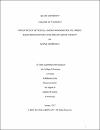PRODUCTION OF LETROZOLE-LOADED MONODISPERSE POLYMERIC-BASED MICROPARTICLES FOR BREAST CANCER THERAPY
| Advisor | Younes, Husam |
| Author | Alemrayat, Bayan |
| Available date | 2017-03-14T09:09:24Z |
| Publication Date | 2017 |
| Abstract | Letrozole (LTZ) is effective for the treatment of hormone-receptor-positive breast cancer in postmenopausal women. However, due to its adverse effects this study was designed to investigate the feasibility of producing monodisperse LTZ microparticles using either Poly-ε-Caprolactone (PCL) or Poly (D,L-Lactide) (PDLLA) as polymeric carriers to improve its release and safety profiles. An amount of 1 g PCL or PDLLA was mixed with 5-30% w/w LTZ in 1-2 % w/v ml dichloromethane. Using Vibrating Orifice Aerosol Generator (VOAG) with a 300-µm orifice at a rate of 0.17-1.7 ml/min, and a frequency of 100-1000 KHz, a constant stream of monodisperse microdroplets was generated. These droplets were collected in a 0.04-1% Polyvinyl Alcohol (PVA) aqueous medium and stirred at 250-500 rpm for 24 hours. Solidified microparticles were collected through filtration and dried under vacuum over 48 hours. Optimized microparticles were characterized for yield, morphology, particle size, entrapment efficiency, thermal and structural properties, in vitro release profile, and in vitro cytotoxicity evaluation using 4′,6-Diamidino-2-phenylindole dihydrochloride (DAPI) staining. Monodisperse microparticles were prepared with a high yield that ranged from 88.2-96.1%. Particles appeared to be spherical with smooth surfaces in both carriers. The particle size varied from 15.6 µm to 91.6 µm and from 22.7 µm to 99.6 µm with a span ranging from 0.22 to 1.24 and from 0.29 to 1.48 in PCL- and PDLLA-based formulations, respectively. Liquid flow rate and PVA concentration were the main contributors to the variation in particle size. Upon optimizing the production parameters, span was reduced to 0.162-0.195. High entrapment efficiency was obtained reaching up to 96.8%. LTZ became completely amorphous at 5-10% w/w drug loading using PDLLA, and at all loadings using PCL. Drug release from PDLLA and PCL followed a biphasic zero-order release over 31 days using 5% and 30% w/w drug loadings. In vitro cytotoxicity results have shown that all LZT-PDLLA/PCL formulations significantly inhibited the growth of MCF-7 cell line at low concentrations reaching 10 nM, suggesting its potential clinical importance in suppressing breast tumor growth and invasiveness. This study indicated the potential of manufacturing new LTZ formulations for monthly administration as intramuscular injections (IM) which offer better release profiles that may result in minimal adverse effects. |
| Language | en |
| Subject | Breast cancer Letrozole Microparticles Pharmaceutical sciences |
| Type | Master Thesis |
| Department | Pharmacy |
Files in this item
This item appears in the following Collection(s)
-
Master in Pharmacy [52 items ]


